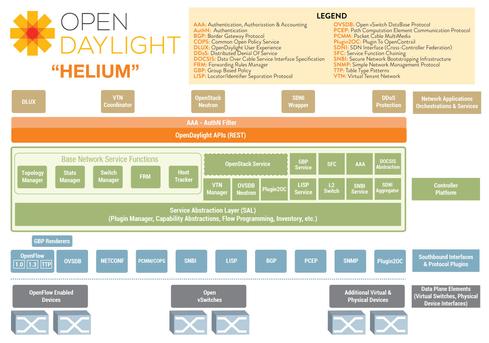The OpenDaylight Project on Monday released Helium, the second version of its open source SDN controller platform. The updated software is designed to be easier to use and more customizable, and it features a policy framework.
OpenDaylight's first open SDN software release, Hydrogen, required a lot of effort and technical skill to deploy. Helium is more easily consumable, said Colin Dixon, the project's technical steering committee member and ambassador and principal engineer at Brocade.
"We've drastically reduced the amount of running you have to do. That was one of our major objectives," he told Network Computing. "It's less of an Erector set and more of a solution for real problems."
Hydrogen, which was released in February, "was a wakeup call to a lot of the naysayers that this community is real, this code is real," and it led many vendors to see it as an alternative to proprietary software-defined networking, OpenDaylight executive director Neela Jacques told us.
Membership in OpenDaylight, a Linux Foundation project, has grown to 41 this year. It was founded by 18 companies, including Cisco and IBM. Some companies, such as HP, have increased their involvement in the project this year. "Some had a toe in the water. Now they have both feet in," Jacques said. About 200 developers are involved in the project.
"OpenDaylight is evolving steadily and the first steps towards broader adoption are starting to occur," Andrew Lerner, a research director at Gartner, said in an email interview. Several vendors have recently announced commercial products based on OpenDaylight technology, including Extreme, Brocade, and Meru, and he expects others to follow suit.
"There is potential here for OpenDaylight to emerge as a key 'center of gravity' in the networking controller space, along with VMware NSX and Cisco ACI," he said.
Packaging and policy
Helium is designed to expand OpenDaylight's reach with a new user interface that Dixon described as "more traditionally Web 2.0" that facilitates easier customization. Also, the software will be packaged using the Apache Karaf container, which will allow users to pick and choose the features they want.
Jacques said the modularity provided by Karaf is a better fit for how developers consume the open SDN software than the three versions of Hydrogen.
Helium also includes a policy framework, which has been an area of debate in the industry.
Jacques said one approach to policy is the declarative model in Cisco ACI that passes policy from the APIC controller using Cisco's OpFlex protocol to the underlying hardware devices, which execute the policies, for distributed network intelligence. However, others support a more imperative model in which there's greater separation of the control and data planes, and network intelligence is centralized in the controller.
For Helium, OpenDaylight opted to include code to support the imperative model, which is found in OpenFlow networks. However, Jacques emphasized that the policy framework is in its early stages. Plans call for adding OpFlex support in the next OpenDaylight release, Lithium.
"I'm incredibly excited that we have the first attempt by the community of one way of doing policy," Jacques said. "But I wouldn't want anyone to say this is the definitive way. Like many of our projects, this is an incubation project."
Other new features in Helium include support for a clustered controller with high availability, authentication for REST interfaces, deeper integration with OpenStack, support for PacketCable MultiMedia, and tools for Service Function Chaining.
Open but supported SDN
Jacques said customers have indicated a preference for open source SDN, but they also want those solutions to have vendor support. He expects most OpenDaylight deployments in production to be vendor-supported products.
Lerner said commercial support for the mainstream networking buyer is an absolute requirement.
"Mainstream buyers will not go with a networking solution (open source or otherwise) unless it is fully supported by a commercial vendor," he said. "Mainstream buyers also want to avoid vendor lock-in, of which open-source is one way to avoid that, but not the only method."
Brocade recently unveiled its Vyatta Controller, which will be based on Helium and available in November. The company said that the controller will work in multi-vendor networks, and that it is committed to adopting future OpenDaylight releases.









